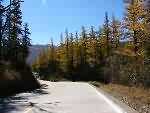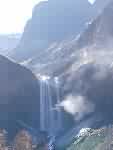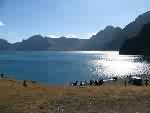- Getting around Lijiang. Dont stay in the Old Towns more than 2 days, there is nothing to do. KRISS Oct 9, 2013 05:46
- 2013 Beijing Temple Fair BENNYLAU Feb 26, 2013 03:29
- Malaysian traveling from KUL - LAX vis Shanghai PVG ZATI_DY Jan 3, 2013 20:15
For the Sake of the Mountain - Changbaishan
- Views: 6034
- |Vote: 0 0
- |Add to Favorites
- |Recommend to Friends
A Market for Passage to Changbaishan
I never thought I'd say it – I just love those taxi drivers. Standing outside the train station, they're waiting to pounce on you as soon as you get out of the gate, they'll do anything to try to convince you to get in their cab, and owing to their persistence, they're one of travel's greatest annoyances. But occasionally, there are times when they are a true blessing. Especially when, despite the fact that the place you want to go is a first class tourist attraction, there'd be no better way without their services.
Before I made the long journey to visit China's deepest crater lake, Tianchi, on a mountain that has been sacred to both the Manchu and Korean people for centuries, I searched high and low online for some valuable tourist information in English – it was uncommonly scarce, and at the time, I wondered how this could be. Look at any photo of Changbaishan and you'll want to go there – the clouds reflected in the pure, turquoise lake, surrounded by the jagged lip of the crater, high above the surrounding 'oceanic forests' of Jilin's Yanbian – it's one of those places in China that is so unique that one would imagine it must attract thousands of visitors every year, and that people would be queuing up in airports all around the world to get a flight to Jilin to go and see it. In fact, the area is only mildly graced by the tourism industry, and despite a few recently completed highway links to the area, it is still relatively remote and difficult to get to. If I were in charge, I'd be setting up regular, cheap bus services from all the nearby cities, and trying to attract as many people as possible to support the local tourism economy. But they are mysteriously quiet on the matter, and Changbaishan remains a destination that deserves the effort it takes to reach it.
Perhaps it's because of the quite advanced environmental awareness that the locals share: all over Yanbian, and indeed Jilin, prized natural resources and rare species get serious protection, and locals I spoke to seemed exceptionally proud of the unique wildlife in the area. The plant that Changbaishan is most well-known for is the local variety of ginseng; it is prized for its medicinal properties, and is the most expensive ginseng on the market, going for up to a thousand RMB for a well-formed root, if not more. I supposed, whilst sitting in the taxi and watching out over the untouched woodlands, that those responsible for the mountain are reluctant to see the place swarming with impolite, rubbish-tossing tourists trampling all over their nature reserve. Still, I'd have liked to have been far clearer about what the trip was likely to cost, and exactly how the complicated charging system worked. Especially seeing as the mountain was every bit as good as it was made out to be.
So let me put it this way. No matter who you are, I unreservedly recommend to you this beautiful place. And, to make it easier for you to plan things, allow me by way of the following account to anticipate on your behalf all those details that might otherwise make for a very frustrating visit, as it very well almost was for me.
Wary of a Scam
I never believe what people say when they approach me to sell something instead of me approaching them. When my travelling companions and I were approached by a suspicious looking taxi driver in Antu city, one of the closest cities to the mountain, offering a 450 RMB return trip to the summit of Changbaishan, I was naturally sceptical. We'd found that there were busses leaving from Antu to the gates, and we found it hard to believe that a taxi fare could possibly be cheaper than the bus would be. But he was uncommonly persistent, and we had to admit that with four of us, the eight individual fares both there and back by bus wouldn't be that much cheaper than the price he was asking. I was adamant I wouldn't be seen dead in a taxi that was travelling a three-hour distance, the antithesis of the kind of independent DIY travel philosophy I normally adhere to, but majority ruled and I sat grumbling in the back seat as my friends enjoyed their ride. It wasn't easy to be angry, though – the Yanbian countryside is so calming and intoxicating that I was soon happily looking out at the glorious views of orange autumn forests broken by wide, cool blue lakes.
The real problem arises when you get to the bottom of the mountain itself. What we didn't know at the gate was that it's still another sixteen kilometres through the parklands before you get to the mountain itself. The entrance fee is 60RMB, but the taxi driver had classically failed to inform us at Antu that in order for him to be able to take us up the mountain, we'd have to pay both his entrance fee and another 60RMB ticket for the vehicle. We refused, and paid our own tickets only and began to walk the rest of the way.
It was a long way. After just fifteen minutes, a car pulled up beside us and asked if we were crazy – to walk to the base of Changbaishan from the gate would take more than five hours. Indeed, our driver was so sure that we'd give in that he paid the entrance fees himself and drove after us into the park, certain we'd get in and compensate him later. He was right. There are no busses from the gate to the summit. The only way to get to the top is by car, and if you haven't brought your own vehicle then you'd have to hire one – quoted price for this service alone was 50RMB. We admitted defeat and got back in the car.
Another classic trick in many tourist attractions in this country is that the price at the door doesn't include the attraction itself. In Shenyang's Beiling tomb, in Beijing's Summer Palace and Ming Ruins, here and in many other places, there is a ticket for the park and a ticket for the place. The 60 yuan door price at Changbaishan got us as far as the car park near the top. From there, there are two options – one, an extra 80 RMB per person for access to the road way to the crater, which takes a lovely scenic route; or you can take a steep walk up to the summit for 60 each. Luckily the driver wasn't going to charge us any more, but we had another unexpected ticket price to pay, and it was most disheartening.
All of these charges wouldn't have been upsetting if we'd known about them in advance. We chose the walkway to the summit, which gave us sufficient time to recover from the extra expenditure, and standing beneath the great waterfall that plummets from the heights of the crater, I started to realise that Changbaishan is more than worth all of that cost put together.
The Sky Lake on the Mountain
That waterfall, cascading sixty-eight metres from the crater, is the world's highest volcanic waterfall. Water from the lake, itself 2189 metres above sea level and self-replenishing, is the source of three great rivers through Jilin – the Songhua, the Tumen, and the Yalu, the last of which divides China and North Korea to the south of the Changbaishan mountain range. Changbaishan, tallest mountain in Northeastern China, is a dormant volcano and has erupted six times since the beginning of the Qing Dynasty, which, being a Manchu rulership, regarded the mountain as sacred, crown of the Manchu Holy Land. Since 1999, seismic research has been carried out at the mountain to predict any possible future eruptions. Changbaishan is also of profound spiritual value for the Koreans, whose historical records show that the mountain, known to them as Paekdusan, formed part of their Northern border – indeed, it was only after 1950 that China claimed their half of the mountain back from North Korea as payment for their involvement in the Korean War. The border bisects the lake, resulting in the rare occasion of foreign tourists hiking innocently around the mountain to be arrested for illegally crossing an international boundary.
The hour-long climb to the summit is a challenge, especially considering the freezing winds that blow through the covered passageways constructed about the long, stone stairway – but the arrival at the peak is breathtaking. A short hike along the river back from the falls, where the ground is covered with small pyramids of stone laid by Korean visitors, and you are standing at the edge of the Lake of Celestial Bathing, no less captivating (although possibly a bit smaller) than the photographs suggest. They say the lake is a magical place. You can often see two different weather systems on each side of the mountain as if they are too respectful to pass over the peak. Others say there are monsters in the lake, and a cartoonlike statue of a kind of Chinese Nessie stands just beyond the expensive drinks tent. It's true, the feeling is magical – to get there, you'd have had to come a long way, across kilometres of ancient forest, long, winding pathways, and passed many an unscrupulous ticket seller.






 Copyright © 1998-2024 All rights reserved.
Copyright © 1998-2024 All rights reserved.
1.
Apr 6, 2008 07:04 Reply
NIEKIE said:
Hi Mishen, Thank you for taking the time to write this article. This summer I'll be in the northeast of China and I would love to visit Changbaishan. Your report really helps me prepare for the trip. Thanks! Niekie
2.
Jul 30, 2006 03:21 Reply
LEMONCACTUS said:
This is helpful as I'm off to visit Changbaishan very soon, I feel more 'prepared' now.